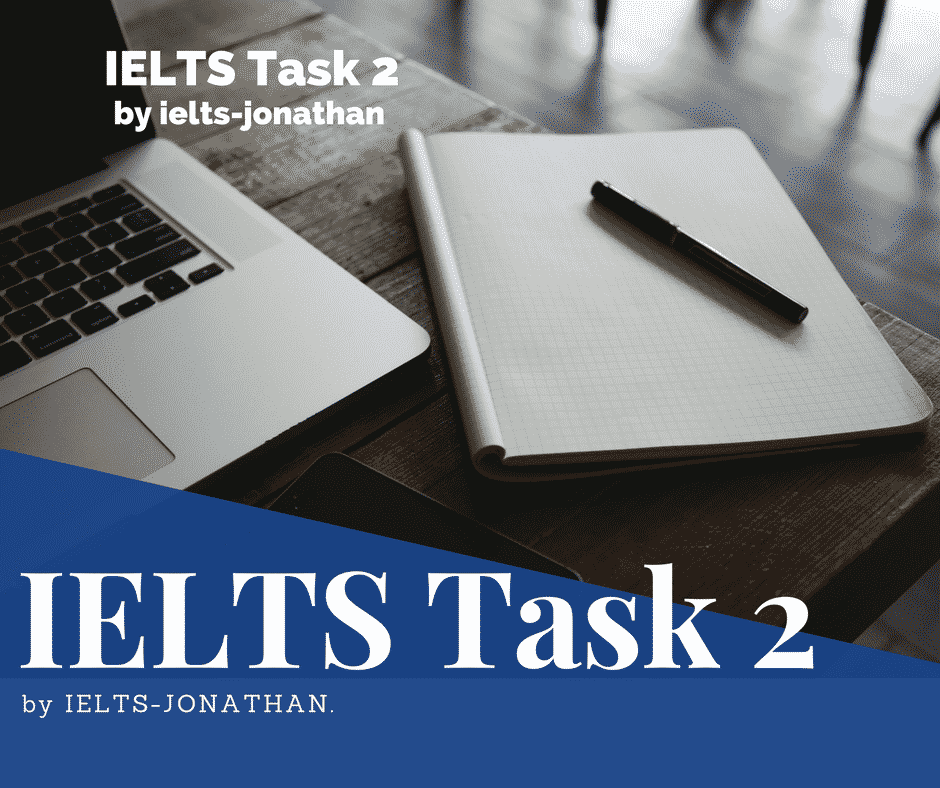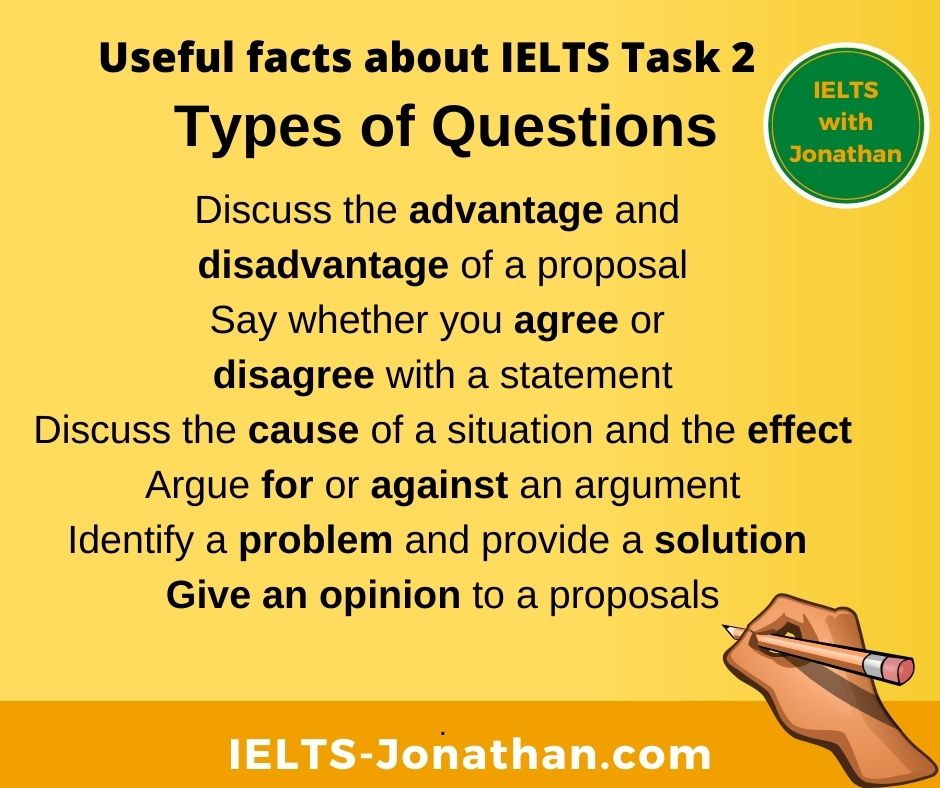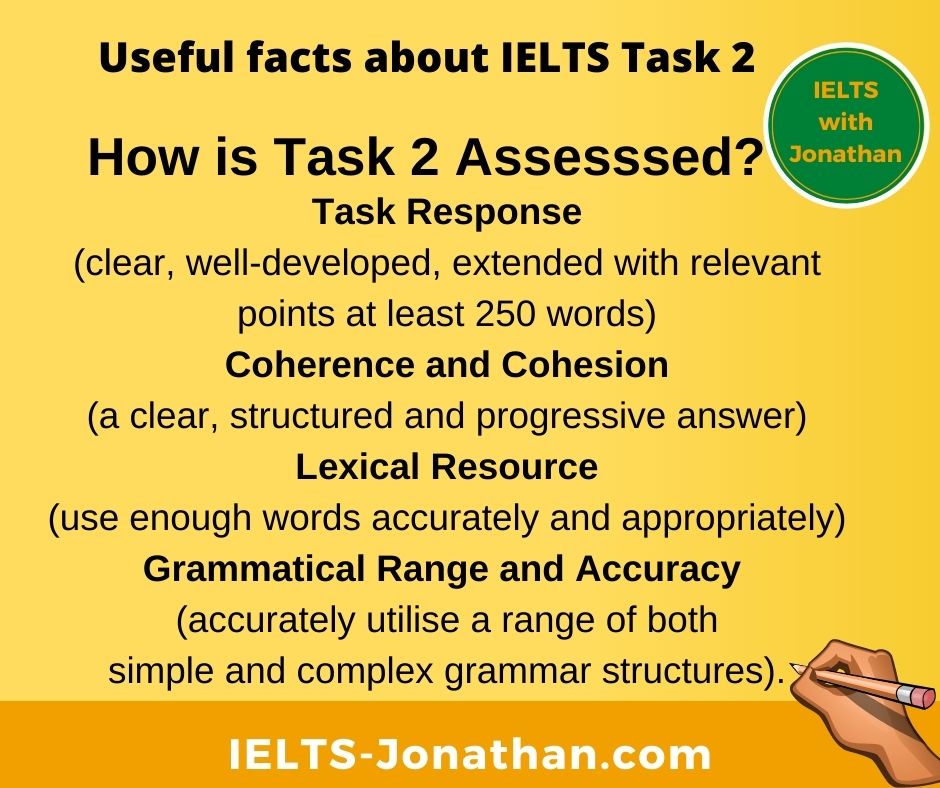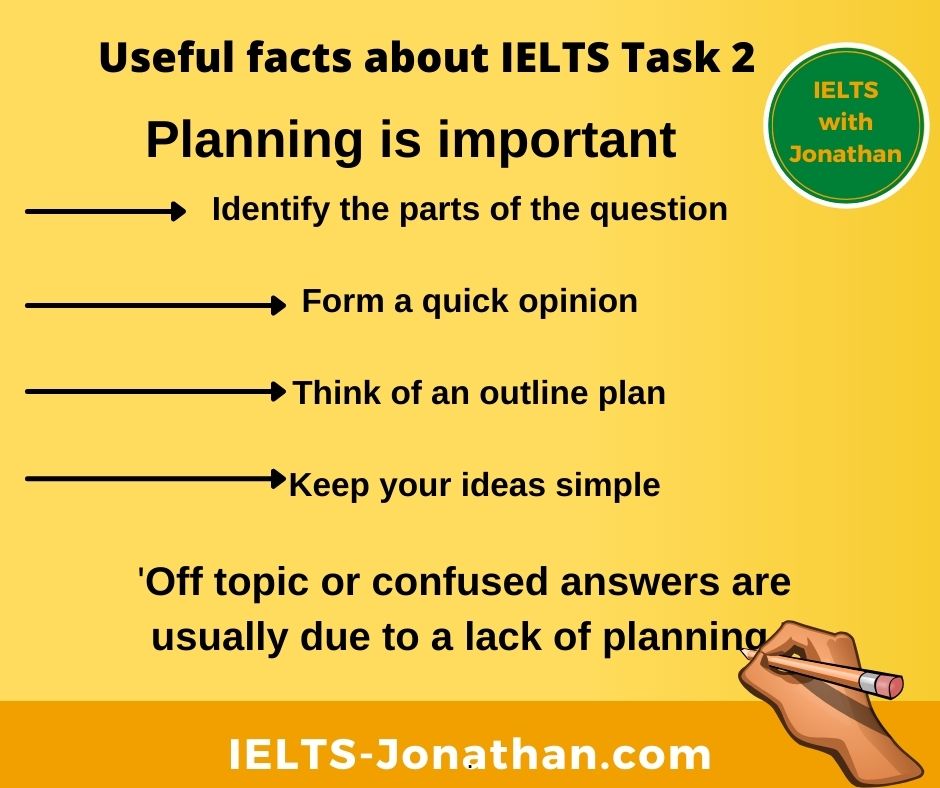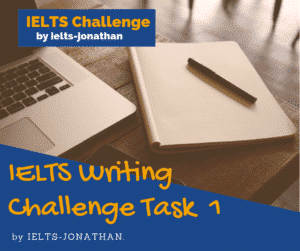Have you found IELTS Task 2 writing challenging or difficult?
Have you been following rules and advice on IELTS , but still find it a problem to write 250 words which score well in Task Response?
Do you understand what you are writing in IELTS Task 2, why your writing and for what purpose? This post will try to answer these questions so you can focus on succeeding in IELTS.
Candidates often struggle to get a good score in IELTS Task 2 writing and many don’t know the reason why?
Unlike IELTS Task 1, there are fewer rules to follow, no charts to comment on or features to notice.
In many ways, it’s a very different task and, unlike IELTS Task 1, it really does need you to talk about your ideas and opinions.
However, having to generate ideas and opinions creates its own student writing problems.
Having too many ideas
I talk to students a lot.
I often hear students say they ‘have lots of ideas’ and yet they can’t get the score that they need for work or university. They don’t understand why the effort they put in, doesn’t result in the score they expect.
Yet, the belief that to write a high-scoring essay you need to have lots of ideas is mistaken and wrong.
While having many ideas is good, trying to include too many ‘great ideas‘ results in essays that are often difficult to read because of poor structure or the amount of grammar and word choice errors.
This will clearly ‘lower the score‘ in the eyes of an IELTS examiner.
Another issue with lots of ideas is that you run the risk of being off topic.
Yes, you need to brainstorm but if you have read and understood the question requirements, the essay you produce needs to be within the scope of the question.
A lack of ideas
The opposite complaint I hear is students who say ‘I struggle to come up with ideas‘ and ‘My ideas aren’t very good‘ or even ‘ I don’t believe in my ideas.’
If YOU struggle to come up with ‘good‘ ideas, just remember this important piece of advice.
The examiner is not interested in your ideas!
That sounds really harsh and even cruel, but it’s a fact.
The examiners job is not to analyse or critique what you believe or say, but consider how well you have written it!
So remember this; ideas need to be relevant, but ‘what ideas you DO have are valuable‘.
It’s important to run with your ideas, rather than waste time worrying about the examiner’s opinion.
Stress free IELTS Essay advice
So now that you’re clear about the issue of ideas, please read on for more ‘stress free essay‘ advice.
What are IELTS Task 2 questions?
IELTS questions are written by trained material writers.
They are written to provoke a considered and reasoned response.
An IELTS essay is very different to a university essay and they have few features in common.
For one, it’s much shorter than a essay at university, is less detailed and relies more on your personal opinion.
Overall, the purpose is to assess your ability and skill to communicate in suitable academic English, as well as provide a logically argued and structured relevant response to a question.
What is a typical IELTS question?
A typical question will be based around a common theme with a question prompt which will test your skills at presenting an argument.
So for example, you may have to discuss the advantage and disadvantages of a proposal, say whether you agree or disagree with a statement, discuss the cause of a situation and discuss the effect, argue for or against an argument, identify a problem and provide a solution, or give an opinion to a number of proposals.
My advice is ‘don’t analyse‘ the different types of IELTS question, it’s a waste of your time.
It’s far more sensible to read a least a selection of good IELTS essays. You will get both a feel of the topics areas and the type of questions and of course, this will help you generate your own ideas!
Are there standard Task 2 phrases I can use?
The clear answer to this is, not really.
An IELTS Task 1 is very predictable. It is easy to learn memorised chunks of language and then apply them to figures, trends and changes.
If you learn memorised sentences in IELTS Task 2, you risk being off topic or irrelevant and being penalised for producing memorised or formulaic language.
However, there are certain phrases that you will find useful to remember, so it is a good idea to practice and learn a bank of useful linking words, as well as very broad general and summarising statements which you can use in your own writing.
How is IELTS Task 2 assessed?
Task 1 is assessed using four marking criteria. The examiner uses these to give your overall mark.
The first criteria is Task Response
Task Response
This focusses on whether you have written an essay that has a clear, effective structure with well-developed, extended and relevant points and which remains a response to the original question.
To do this successfully, it is fair to say you need to write an answer of at least 250 words within 40 minutes which remains on topic.
Coherence and Cohesion
In this area the examine looks at your ability to write a clear, structured and progressive answer.
For example, the examiner will consider whether paragraphs been used effectively and whether sentences and ideas linked well with suitable linking words and phrases to make the answer organised and logical
Lexical Resource
To assess you awareness in vocabulary the examiner considers your ability to use words accurately and appropriately.
So they will look at how you have spelt words, consider if word endings are accurate or correct, whether the word choices are formal and appropriate and whether you know enough vocabulary to avoid repetition in your writing.
Grammatical Range and Accuracy
The last area of assessment is related to grammar.
Not only does this assess how much your grammar is error free, but it also assess whether you can utilise a range of both simple and complex grammar structures and display them accurately, and not inappropriately, according to the task question.
As an IELTS teacher, it’s easy to see candidates make silly mistakes which lose marks and lowers the Band Score.
Is there a ‘one fit all’ approach to IELTS Task 2?
Unfortunately not, but there are some things you can do. 🙂
You only have 40 minutes to write a response of at least 250 words, so you need to use this time effectively.
Following my advice with any Task 2 question will help ‘make your ideas and opinions more logical and easier to read’, so you can ‘focus on aspects of grammar and vocabulary’.
While there is no exact formula to follow, there are simple steps to make the writing as ‘stress less‘ as possible.
So to make writing as ‘stress free‘ as possible, it better to think like a machine and follow a step by step process.
Why is planning important?
IELTS is not about being creative, IELTS is about informing the examiner through a well-written and persuasive argument and opinion.
Step 1 Identify the parts of the question
This means identify and then recheck the topic area, and what the question is asking you to do.
So for example, is it asking you to give advantages and disadvantages of an international education, and say whether there are more or less, or is it asking you to agree or disagree that this kind of education develops the individual more.
Step 2 Form a quick opinion
This doesn’t simply mean whether you agree and disagree with the statement but actually what do you think.
You only have 40 minutes to write this part of the test, so you don’t want to waste time changing your mind half way through. This leads to confusion.
What do you think, what’s your opinion and stick to it!
Step 3 Think of an outline plan
Check you understand the question and outline what your going to write.
You can do this by rereading the question and identifying the topic. Use the structure words to plan a line of argument.
You can use your own experience, but it is important to stick to the topic area of the question and answer it fully!
Too often, I see students attempt to answer their own question, be off topic by answering a similar question or even worse, attempt a question memorised from class.
This is usually due to a lack of planning.
Step 4 Keep your ideas simple
Whether you have many ideas or a just a few, it’s important to know that good writing tends to limit itself to simpler ideas.
You could be a novice or an expert in the question topic area, but you will be wasting time displaying your expertise, or trying to!
All that really matters is that the ideas you have are explained sufficiently well.
In order to do this, limit the number of points you want to make. Your writing is bound to be better!
Is there an IELTS structure you can use?
Different teachers, teach different structures.
There are complete courses that explain basically the same principles, but often in an unnecessary, complicated way.
Remember I said it was better to read a selection of good essays and get a feel for the different types of question.
Do this and you will be a more effective writer.
What you need to know is..
An IELTS essay is structured as a regular, but smaller, essay, in that it has an introduction, with 2 or even 3 body paragraphs, and a conclusion.
That’s it!
You also need to know
Each paragraph will serve a particular function depending on the type of question you’re answering.
So, from reading the question, you should be clear if the body paragraphs are about advantages, problems, solutions, effects or whether you are for or against.
We are becoming increasingly dependent on computer-based technology.
How do you think it will change in the future?
Is it good for us to rely so much on computers?
Can you see how you could write four paragraphs which includes a paragraph about future developments and one discussing whether it is good for people to rely on computers?
Planning Time
Keep planning and your introduction short.
As you only have about 40 minutes to write the essay and some of that time must be spent on planning, your introduction should be quite brief so you can get to the body paragraphs sooner than later.
Remember these basic key points in planning your essay.
A good introduction has a sentence that presents the essay topic or context and a statement of what you are going to write about next.
To be coherent and cohesive, good body paragraphs have one controlling idea and a small number of relevant sentences that support the controlling idea
Finally, a good conclusion is short and finalises the discussion points of your essay and brings your discussion to a close with your opinion, if needed.
How can I write an introduction?
Students spend too long on the introduction and it really doesn’t add much to the overall writing.
Only try to write three or four sentences, which is about 6o words, but make those sentences relevant.
- Sentence 1 – Paraphrase the task question or write a relevant general topic statement. Try to use synonyms of the key words in the question.
E.g. – In periods of rising unemployment, employers need to do very little to encourage their employees to work hard as employees may fear losing their jobs.
- Sentence 2 – State your opinion or point of view on the question being asked and what you intend to argue.
E.g – In contrast, when job vacancies are scarce, employers have to find methods of rewarding their workers to prevent them from taking work elsewhere. This can often be in the form of an individual financial reward.
- Sentence 3 – Depending on the essay, give an essay overview including a summarising phrase like his example:
E.g. – However, I argue that this can have a negative impact on other employees and that there are other practises worth considering.
In periods of rising unemployment, employers need to do very little to encourage their employees to work hard as employees may fear losing their jobs.
In contrast, when job vacancies are scarce, employers have to find methods of rewarding their workers to prevent them from taking work elsewhere. This can often be in the form of an individual financial reward.
However, I argue that this can have a negative impact on other employees and that there are other practises worth considering.
How many supporting paragraphs should I write?
Supporting Paragraph
A paragraph should contain one main idea.
There should generally be two supporting paragraphs that include your ideas and supporting examples to fully answer the task question.
More than two supporting paragraphs will increase your word count significantly.
You won’t lose marks for this, but you won’t gain any and will you have time to finish the conclusion?
Each paragraph should contain the following four sentences and should refer to one idea per paragraph:
Paragraph 1:
- Sentence 1 – State position one
Eg. A common practice is to offer additional money to employees who are working exceptionally hard and this is often done in companies with products to sell.
- Sentence 2 – Explain why
Eg. For example, estate agents, insurance sales people and department stores can offer simple commission on items sold, and to encourage further sales.
- Sentence 3 – Give an example that supports your idea.
Eg. Another approach that is of benefit to people who do not have direct access to the public is for management to offer a bonus to all staff at the end of the year if the profits are healthy.
- Sentence 4 – Summarise showing how your example refers to the main idea.
Eg. However, this does not allow the recognition of individuals who have genuinely worked harder than others.
The opposing paragraph should again include your ideas and supporting examples to fully answer the task question and should contain the following four sentences and generally refer to one idea
Paragraph 2:
- Sentence 1 – State position two
Eg. Another possibility is to identify excellent staff through various incentive schemes such as Employee of the Month to make people feel recognised.
- Sentence 2 – Explain why
Eg. This might increase competition between employees and lead to increased productiveness.
- Sentence 3 – Give an example that supports your idea.
Eg. Coffee shops, hotels and restaurants may also allow staff to accept tips offered by customers and clients who are satisfied with the service.
- Sentence 4 – Summarise the paragraph showing how your example refers to the main idea.
Eg. However, tipping might be considered an unreliable source of money and does not favour everyone equally, therefore this may not be an effective practice.
What should I write in the conclusion?
Conclusion
The Conclusion is the shortest part of the essay and shouldn’t be more than 1 or 2 sentences.
What you write in the conclusion depends on what you have said in the essay, but it should generally be brief.
It should containing one or two sentences that paraphrase your essay discussion and should also restate your opinion.
- Sentence 1 – Summarise the essay. Use a suitable linking phrase (i.e. In conclusion, To sum up, Consequently) then move to an overall summary of your writing
E.g. In my opinion, employees generally want to be recognised for their contribution whether through additional money or encouraging words. They also need to feel that their contribution to the whole organisation is worthwhile.
- Sentence 2 – Final Thoughts.
Eg. Therefore, good management should recognize this need and should respond appropriately.
What kind of language should I use in Task 2?
The IELTS exam tests your ability to write Academic English – a style of English needed at University or in formal situations such as reports.
This means there are certain language features you should avoid in your essay.
Formal writing means you should not use contractions such as
I’m, I’ve, doesn’t , don’t ,isn’t or won’t, use the formal written alternative which is two words.
Avoid using colloquial words or slang such as trash, it’s like, literally, really or very and avoid using use ‘spoken’ language such as ‘I’m gonna / I wanna’. Always write the written alternative ‘I am going to / I want to’
You can use your experience, but avoid personal stories like ‘My mother has a credit card so it is really useful’ ‘ I use WhatsApp to keep in contact with my friends, I use it every day but other friends use WeChat’
Don’t use emotive language such as I really hate, I really love, I think it’s disgusting, as it will stand out and spoil the tone of your essay.
Final thoughts…
Following these steps can help you overcome the main issues I see in IELTS: too many ideas, written in a unorganised way leading to errors and poor examples of vocabulary and grammar.
Remember, you only have 40 minutes and you need to write about 250 words.
What and how you write depends on your own ideas and the question but a few, good ideas, explained in a coherent and logical way is the best way to impress an examiner.
Here’s an example essay written by a high-level student.
Some employers reward members of staff for their exceptional contributions to the company by giving them extra money. This practice can act as an incentive for some but may also have a negative impact on others.
To what extent is this style of management effective?
Are there better ways of encouraging employees to work hard?
In periods of rising unemployment, employers need to do very little to encourage their employees to work hard as employees may fear losing their jobs. In contrast, when job vacancies are scarce, they have to find methods of rewarding their workers to prevent them from taking work elsewhere. This can often be in the form of an individual financial reward. However I argue that this can have a negative impact on other employees and that there are other practices worth considering.
A common practice is to offer additional money to employees who are working exceptionally hard and this is often done in companies with products to sell. For example, estate agents, insurance sales people and department stores can offer simple financial rewards for sales. Another approach that is of benefit to people who do not have direct access to the public is for management to offer a bonus to all staff at the end of the year if the profits are healthy. However, this does not allow the recognition of individuals who have genuinely worked harder than others.
Another possibility is to identify excellent staff through various incentive schemes such as Employee of the Month to make people feel recognised. This might increase competition between employees and lead to increased productiveness. Coffee shops, hotels and restaurants may also allow staff to accept tips offered by customers and clients who are satisfied with the service. However, tipping is an unreliable source of money and does not favour everyone equally, therefore this may not be an effective practice.
In my opinion, employees generally want to be recognised for their contribution whether through additional money or encouraging words. They also need to feel that their contribution to the whole organization is worthwhile. Therefore, good management should recognize this need and should respond appropriately.
If you feel you are ready for the Task 2 Writing, Try our Writing Correction Service.
If you liked this post or found it useful, please comment and share.
There are some free IELTS samples you can use to practise and you join my mailing list for Writing Challenges
Downloadable IELTS Academic Writing Samples
Academic Writing Sample Task 2
Academic Writing Sample Task 2
Downloadable Writing Answer Sheet
IELTS Writing Answer Sheet Task 2
Downloadable Writing Sample Script
IELTS Academic Writing Sample Script
The Best Approach to Task 2 Writing
Paragraphing in Task 2 Writing
Writing – Benefits of a Foreign University Education
I’m Jonathan
I’ve taught IELTS and University English in more than a dozen universities and schools around the world.
I’m a parent, traveller and passionate about language teaching and helping students achieve their dreams.
Whilst living in Austria or working in Asia, I run IELTS courses to help students get to where they want to be.
If you are serious about IELTS, connect with me to see how I can help you.

